Price of Football 2014: Why fans flock to Borussia Dortmund
- Published
'In Germany, the fan is king'
Borussia Dortmund's slogan "echte liebe" - or "true love" - says it all. The final whistle goes at the majestic Westfalenstadion. Dortmund have lost at home.
And yet none of the players disappear down the tunnel. None of the fans leave the ground. Defiant, determined, the 25,000 fans who religiously flock to the mythical south stand continue to serenade their team.
Manager Jurgen Klopp joins his players on the edge of the penalty area, where they stand for five minutes in awe, gazing up at one of European football's great sights, the "Gelbe Wand" (Yellow Wall), a sea of luminous shirts, scarves and flags. Towers of smoke rise from pockets of fans and waves of noise cascades down the steep terrace and onto the players.
This love is unconditional.
Moments such as this are why Dortmund are one of the last great romantic clubs. The tickets - and beer - are cheap, the atmosphere is raw and seductive and fans, not finance, come first.
When Dortmund reached the 2013 Champions League final, the club received 502,567 applications for 24,042 tickets. The entire city has a population of 580,956. True love, indeed.
Football is all encompassing here, it reaches ever facet of life. One fan even leaves the club shop having just bought a Borussia Dortmund-branded lawn mower. The chance to experience this love affair is attracting more than 1,000 fans from England to every home match.
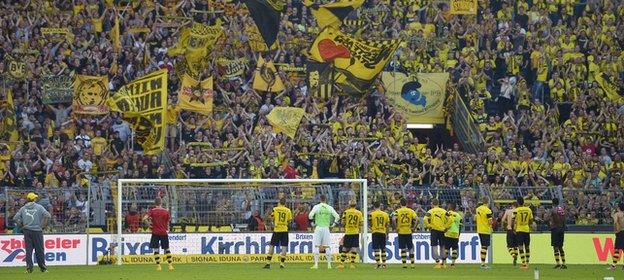
The scene in the Westfalenstadion after Dortmund's defeat by Hamburg
It is a scarcely believable figure, but walk around the stadium and British accents are audible among the 80,000 at Signal Iduna Park. "We jump on the Channel Tunnel train," says Matthew Gerrard, from Kent.
"We make a weekend of it. With tickets, accommodation, transport, this trip will cost £65. When you think it cost me £51 to see the Arsenal game last season, you can see the benefits."
Another group soaking up the beer and bratwurst outside the stadium are wearing Stoke shirts, while there are also fans from Aston Villa, Chelsea, Arsenal, Liverpool and Port Vale. When you discover that the majority of Dortmund's 55,000 season-ticket holders have paid an average of £9 to see this match, this influx begins to make perfect sense.
Jack, a Chelsea fan, is here with two of his friends from London.
"Prices are too high in England," he says. "But here, everything is cheap. It's a better experience for the fan and the atmosphere is incredible."
Dortmund are increasingly aware of the English invasion. The club has even begun to conduct stadium tours in English. "It's amazing," says marketing director Carsten Cramer. "It's always nice when English fans tell me that including the cost of a flight, two beers and a ticket, they do not pay more than a match in England.
"Why are tickets cheap? Football is part of people's lives and we want to open the doors for all of society. We need the people, they spend their hearts, their emotions with us. They are the club's most important asset."
It is a phrase that many clubs use, but two stories demonstrate why it is, perhaps, far more than words here in Dortmund. In recent months, the club's caterers asked them to increase beer prices for the first time in three years. But Dortmund said no.
"What is the economic sense for the club to increase the price by 10 cents?" Cramer added. "For the overall economic success of the club it is not important to increase the price of a litre of a beer. It is still money, but not a lot to the club. But it does affect our fans, if they are spending their money match after match."
The Gelbe Wand/The Yellow Wall |
|---|
Bayern Munich and Germany midfielder Bastian Schweinsteiger was recently asked whether he feared Dortmund's players or their manager, more. He responded by saying: "It is the Yellow Wall that scares me the most." The sudtribune, or south stand, has the capacity to assault the senses with its raw passion and noise. More than 25,000 people stand on the terrace during Bundesliga games. For European games, safe standing rails are replaced by seats. |
Puma, the club's shirt manufacturer, also urged them to increase the price of the kit after three seasons at the same figure. Dortmund, once again, said no.
"We try to be as fair as possible. It is easier to ask sponsors for cash than the fans," Cramer says.
Dortmund plan to introduce free wifi to all fans inside the stadium from January. Other clubs are doing the same, but not quite in the way that Dortmund are.
While the club want to encourage fans to engage with them online, order food and send tweets, once the match starts, they want their fans to put their phones down, use their hands to clap, their eyes to watch and the voices to sing.
And to ensure that remains the case, the club are discussing plans to dip the wifi signal once the match begins. Supporting the team is the be all and end all.
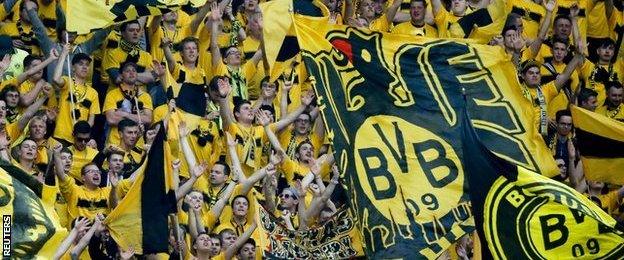
Borussia Dortmund have the highest average attendance in the world
It is why Dortmund do not sell drinks in their corporate boxes during the game. It is why the stadium announcer demands fans return to their seats in time for the start of the second half. The club could allow fans to spend more money buying food and drink. But not at Dortmund.
"We are a football club," Cramer adds. "If the football doesn't run properly, the rest of the business would not work. The business is part of a train, but not the engine."
Cramer arrives in the room having spent much of the past 15 minutes on the phone to a fan with a complaint - yes, they do exist.
"It is important that the fans know that their concerns are being listened to, that as a club we have a feeling for what they want," he says.
"Our CEO is in a deep conversation with the fans, we have five guys who just work for our supporters. Our fans know we care about what they think."
Dortmund fan Marc Quambusch, from Kein Zwanni, external (Not Twenty), a supporter campaign to keep tickets cheap, admits he is proud of what Dortmund has become, having grown up looking to England as the home of football's soul.
Dortmund stats - the club: | |
|---|---|
Season ticket holders: | 55,000 |
Waiting list for season ticket: | 30,000 |
Stadium capacity: | 80,645 |
Average home attendance: | 80,291 (highest in the world) |
Number of fans attending in 2013-14 season: | 1.855 million |
"When I was young, we all watched English football, the Kop and said 'yes, that is what football is all about'," he says.
"Now, when we go to English football, the stadiums are quiet and we say that it is actually quite boring. If you price people out, you change the atmosphere. If you price people out, it isn't the people's game anymore."
Dortmund's fervent atmosphere is the envy of Europe but it is not there by accident.
The club keeps prices low precisely to ensure all areas of society are represented in the crowd. There is no such thing as the 'prawn sandwich brigade', external in these parts.
"Prices are also going up here and have gone up in recent seasons. But Dortmund is one of the homes of fan culture now, every type of person in this city can afford to go to the stadium," Quambusch adds.
"Not just the old people or the rich. That isn't the case in England."
It is important to remember this is a club run by the fans, for the fans. The Bundesliga's, external "50% plus one" rule requires clubs to be owned by their members. All but three of the 36 Bundesliga clubs are owned or controlled by their members, with Wolfsburg, Bayer Leverkeusen and Hoffenheim the exceptions.
It is a model that is the envy of many in Europe, especially when it is so successful, as Dortmund have been since 2010, winning two Bundesligas and reaching the Champions League final.
"You have to find your own way," Cramer says. "I am not that arrogant to think that our way might be the right way for all clubs.
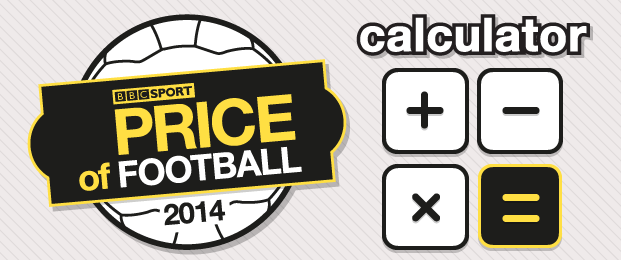
Visit the Price of Football calculator to see how much you spend supporting your team.
"This way fits to the core values of our club. We are a very, very down to earth club.
"If you know what your club stands for, it helps you know how to act. But I could put the figures to other clubs and say there you go. It is the Dortmund way, and for us, it is most certainly the right way."
The Dortmund model may not, though, be as attractive for those clubs determined to make money above all else. The amount of money Arsenal generate on match days dwarfs those of the German club, despite having 20,000 less seats.
"This is impressive," Cramer added. "But if we were to ask for prices like this, we would lose the people. And the people are one of the most important assets for our club."
English fans will continue to flock to this unglamorous corner of Germany. It is an intoxicating experience, it is cheap and the football is among the best in Europe. What is not to like? Perhaps it is that Germany reminds English football fans of something they think the game in this country has forgotten.
Modern football may be the land of the sporting superstar, but in Germany the fan is king.
- Published15 October 2014
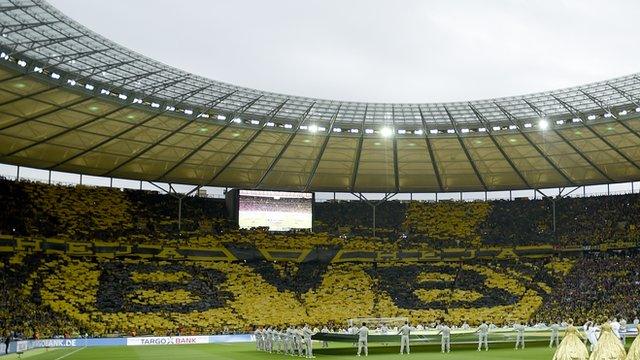
- Published15 October 2014
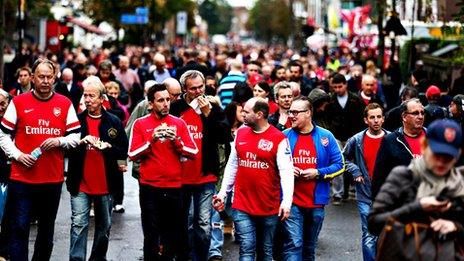
- Attribution
- Published15 October 2014
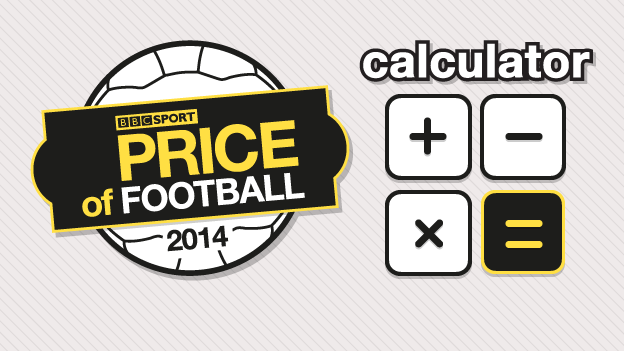
- Published15 October 2014
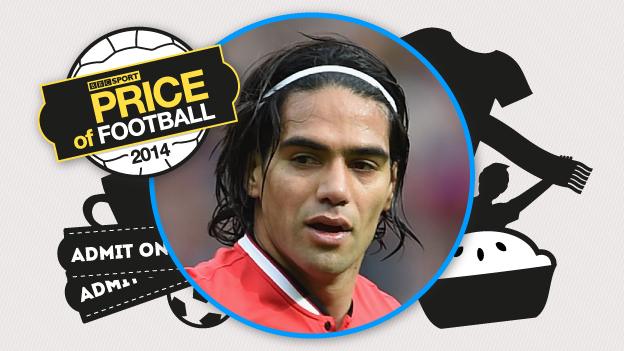
- Attribution
- Published14 October 2014
- Published15 October 2014
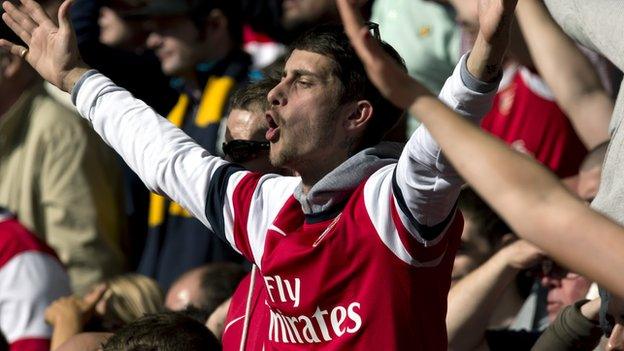
- Published15 October 2014
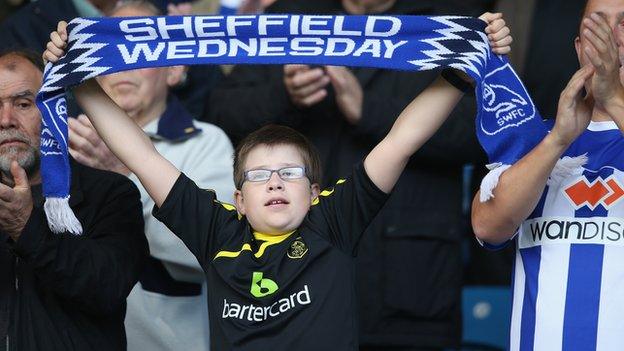
- Published15 October 2014
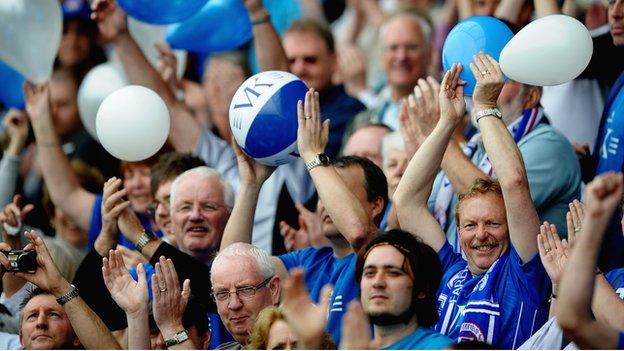
- Published15 October 2014
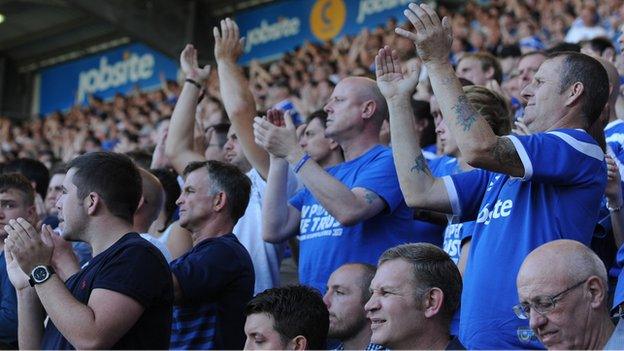
- Published15 October 2014
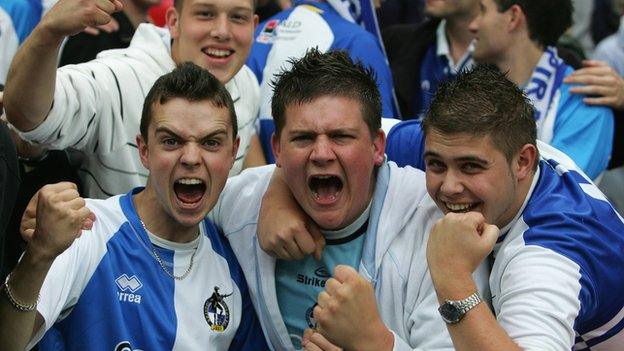
- Published7 June 2019
